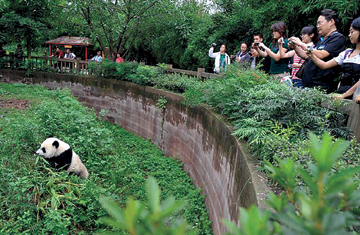
Panda to the crowd Tourism helps fund research
Buildings and enclosures at the Wolong National Nature Reserve — the world's largest and best-known panda conservation area — were all but destroyed in the devastating earthquake that hit Sichuan province in southwest China in May 2008. Although only one panda, crushed under a collapsed wall, died at the UNESCO World Heritage site, many others were injured or escaped and 12 staffers lost their lives.
So far, so gloomy. But the Chinese authorities have been working hard and spending harder (over $36 million has been allocated to the Wolong reconstruction effort) to make sure the future of their national icon is secure.
After the quake, most of the more than 60 Wolong pandas, including several cubs rescued by a keeper who risked his life to save them, were sent to Wolong's sister facility, the Bifengxia Panda Base, about a four-hour drive south. Another four, clearly traumatized, were taken to the Chengdu Panda Base, located near the provincial capital of Chengdu and the so-called panda capital of the world. It's one of China's most important breeding centers and its state-of-the-art facilities and resident specialists made it the natural destination for the distressed bears, which needed round-the-clock attention. Housed away from the public, they were, thankfully, on the road to recovery after six months and sent to Bifengxia, which has more space. It's hoped that they will recuperate fully there, eventually returning to Wolong once it's been rebuilt.
British TV wildlife presenter Nigel Marven has just finished filming a series on the Sichuan pandas. Such is his status in the province, he's been appointed Chengdu's "panda ambassador," only the second person to receive the accolade after kung fu star Jackie Chan. "With only 200 or so captive pandas, it was vital to save the ones at Wolong as they are part of a successful breeding program," he says.
Such programs are rare. For years, scientists employed desperate and futile reproduction methods that included feeding pandas Viagra or subjecting them to videos of pandas mating in a bid to visually stimulate their libidos. Nobody realized that they are intensely solitary animals in the wild, only getting together for the two or three days of the year when females are on heat.
They've finally got the hang of things in Chengdu, however. A baby panda was born there in July, the first surviving cub of the birthing season. As the people of Sichuan rebuild their lives in the wake of tragedy, so do their beloved mascots.
Chengdu Panda Base offers guided tours and interactive educational facilities. For more information, see www.panda.org.cn.
Got an awful travel gripe? The Avenger may be able to sort it out for you.
